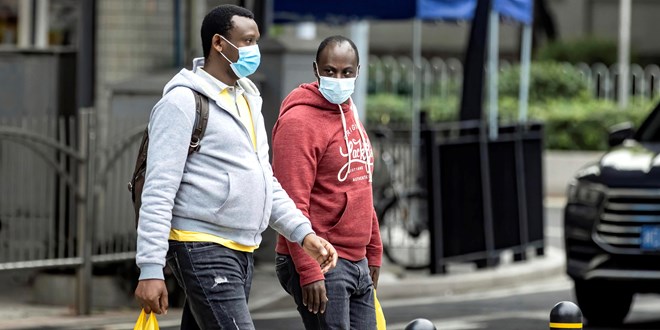
Monday April 20, 2020
By Carien Du Plessis

People wearing masks in Guangzhou, Guangdong province. Video posted on social media over the weekend showed people of African descent being evicted, sleeping rough and being refused service in shops © Alex Plaveski/EPA/Shutterstock
Africans are not convinced that China is doing enough to curb alleged racism related to the coronavirus.
Two video clips of Africans apparently being denied entry into Chinese shopping areas went viral over the weekend, reigniting the row over accusations of racism in Guangzhou amid fears by local authorities over the spread of the Covid-19 epidemic there.
The videos come barely a week after Chinese authorities promised to look into claims that Africans were being evicted from their residences in Guangdong province and being forced to go into quarantine even if they haven’t tested positive for the coronavirus.
It is not clear where or when the video clips that did the rounds on social media and WhatsApp were taken, but one of these shows a black woman in a mask being denied entry into a shopping area by what appeared to be a security guard, and the other appeared to show scuffles between Chinese and black people outside what appeared to be a market.
The video clips did the rounds especially on Kenyan social media, accompanied by a clamour for the Kenyan ambassador to China, Sarah Serem, to repatriate Kenyans living in China who want to go home. Kenyan citizens have accused their government of acting too slowly.Meanwhile, Nigerian Foreign Minister Geoffrey Onyeama on Saturday promised that arrangements would be made to bring Nigerian nationals home from China. After tweeting images of his second meeting in a week with the Chinese ambassador to Nigeria, Zhou Pingjian, he said “98% of the issues have been resolved”, but blamed China for not keeping its part of the deal.
“Contrary to the promises made and the guarantees given, the situation does not seem to have ameliorated and this was totally unacceptable,” he said.
“We have stories of Nigerians who have been evicted from their residences who were unable to get back in.”
He also said some were quarantined in expensive hotels with no justification, or were not being served in restaurants and shopping malls. He admitted “the narratives are conflicting”, even among Africans themselves, but the main narrative was “unacceptable treatment of Nigerians and indeed other Africans in Guangzhou”.
Some South Africans have also complained about being forced to leave their places of residence to go into quarantine without having tested positive for the coronavirus. Days after the South African government put out a statement politely calling on the Chinese government to investigate, the governing ANC on Saturday reached out to the Communist Party of China to issue a similar plea.
“The ANC calls on the Communist Party of China and its government to act expeditiously in launching an investigation into these alleged actions and take appropriate remedial measures, especially in the Guangdong province,” according to the statement by the party’s chairperson of the international relations sub-committee, Social Development Minister Lindiwe Zulu.
Zulu added: “The ANC considers the Communist Party of China as a friend and strategic political and economic partner, since China does not have a colonial history with Africa.”
The press statement is unusual because the ANC doesn’t comment on every aspect of South Africa’s relationship with China. The Chinese embassy has supported ANC activities in the past, most recently an ANC Women’s League dinner and outreach on International Women’s Day last month. It has also in the past supported the ANC’s political school.
The South African Human Rights Commission also stepped into the fray on Sunday 19 April, saying, “the foundational underpinnings of South Africa’s constitutional democracy, being equality, dignity and freedom, apply to all people globally”.
The commission said if the allegations about forceful testing and quarantining of Africans were found to be true, this would be in contravention of their rights to dignity and equality, “depending on what actually happened”.
The commission said it would ask the Network of African Human Rights Institutions to call on the Chinese authorities to “intervene and stop the discriminatory treatment of African nationals in the country”.
The spat came in the week that China reached out to allies after United States President Donald Trump accused the World Health Organisation of withholding critical information about Covid-19 and of being under the control of China – a claim that does not appear to be supported by available facts.
On Friday, the Chinese embassy in Pretoria on Twitter praised South Africa’s statement expressing concern about Trump’s announcement to cut funding to the WHO, saying: “At this critical moment in fighting against the COVID-19 pandemic, the international community should stand together. The standpoint of South African government reflects the common aspiration of the world.”
A number of African diplomats and leaders met their Chinese counterparts earlier in the week following a social media storm with videos showing Africans being forced out on the streets in Guangzhou after some in the community there tested positive for coronavirus.
A tweeted video clip of a news item following the outrage shows an apparent charm offensive consisting of Chinese nationals in personal protective gear delivering food and flowers to Africans who seemed to be in quarantine in a hotel.
Ghana’s ambassador to China, Edward Boateng, afterwards said the racism row was due to “miscommunication”. He said the owner of an African restaurant tested positive for the virus, and the Chinese authorities assumed “that most Africans probably go and eat from that restaurant”. In a “knee-jerk reaction” they decided to test all Africans, regardless of nationality, he said.
He also claimed some landlords panicked that they might be found out that they had been renting rooms to “people without legal status”, and hence the evictions. Boateng said he considered the matter to be settled now.